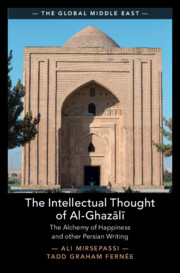Book contents
- The Intellectual Thought of Al-Ghazālī
- Reviews
- The Global Middle East
- The Intellectual Thought of Al-Ghazālī
- Copyright page
- Contents
- Acknowledgments
- Note on Transliteration
- Introduction
- 1 The Time and Life of Ghazālī
- 2 Reading Ghazālī in the West
- 3 The Poetic Imagination and the Politics of Ambiguity
- 4 The Troubled Orthodoxy in the Academic Study of Islam
- 5 A Path to Reform
- 6 A Cosmopolitan Reading of Ghazālī
- 7 Ghazālī’s Practical Ethics
- Bibliography
- Index
3 - The Poetic Imagination and the Politics of Ambiguity
Published online by Cambridge University Press: 16 January 2025
- The Intellectual Thought of Al-Ghazālī
- Reviews
- The Global Middle East
- The Intellectual Thought of Al-Ghazālī
- Copyright page
- Contents
- Acknowledgments
- Note on Transliteration
- Introduction
- 1 The Time and Life of Ghazālī
- 2 Reading Ghazālī in the West
- 3 The Poetic Imagination and the Politics of Ambiguity
- 4 The Troubled Orthodoxy in the Academic Study of Islam
- 5 A Path to Reform
- 6 A Cosmopolitan Reading of Ghazālī
- 7 Ghazālī’s Practical Ethics
- Bibliography
- Index
Summary
This chapter offers a reading of Ebrahim Moosa’s Al-Ghazālī and the Poetics of Imagination, which, through the concept of dihlīz, identifies “the Ghazālian secret” to overcoming false binaries, whether between Ghazālī and his peers or between Islam and the West, as the embrace of a liminal existence. Moosa renders the debate between Ghazālī and the Muslim philosophers (p. falāsifa) of his time as analogous to the contemporary struggle between post-imperialism and globalization. Although his reinterpretation of dihlīz opens new perspectives, we contend that his argument imposes postmodern precepts onto an Abbasid thinker. The historical Ghazālī conceived of the Abbasid Empire in terms of an unfolding divine will and so sought to empower it. Ultimately, we suggest that Moosa marshals Ghazālī to accord mysticism, which replaces objectivity as the “master” paradigm, higher epistemic value than modern reason. This does not correspond to the life and thought of the historical Ghazālī, whose priorities concerned guaranteeing the success of a state project to which he was existentially committed.
- Type
- Chapter
- Information
- The Intellectual Thought of Al-Ghazālī , pp. 84 - 130Publisher: Cambridge University PressPrint publication year: 2024

